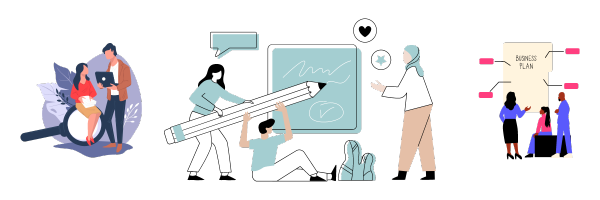Inspirational journeys
Follow the stories of academics and their research expeditions
How to Transition from Traditional to Digital Healthcare Roles

Abstract
The healthcare industry is undergoing a digital transformation, necessitating the evolution of roles and responsibilities for healthcare professionals. Transitioning from traditional healthcare positions to digital healthcare roles requires acquiring new skills, adopting innovative mindsets, and embracing technology. This paper explores the steps professionals can take to navigate this transition, focusing on upskilling, leveraging transferable competencies, and understanding the landscape of digital healthcare. By examining case studies and industry trends, this guide provides actionable strategies to support professionals seeking to thrive in the digital health ecosystem.
Keywords: digital healthcare, healthcare transition, digital health skills, traditional to digital roles, healthcare technology careers
Introduction
The advent of digital health technologies has revolutionized the delivery of healthcare services, creating new opportunities and challenges for professionals. From electronic health records (EHRs) to telemedicine and artificial intelligence (AI), the healthcare landscape is rapidly evolving. This transformation has necessitated a shift in the skill sets required to deliver effective care.
For traditional healthcare professionals, adapting to digital roles involves more than just learning new technologies. It requires a holistic understanding of how digital tools integrate with patient care, workflows, and organizational goals. This paper provides a comprehensive roadmap for healthcare professionals transitioning into digital roles, highlighting the importance of education, adaptability, and strategic career planning. Understanding the nuances of this transition is essential for those who wish to remain relevant and thrive in this dynamic field.
Understanding Digital Healthcare Roles
Digital healthcare encompasses a wide range of roles that leverage technology to enhance patient outcomes, improve operational efficiency, and support healthcare innovation. Examples include:
Health Informatics Specialists: Professionals who manage and analyze health data to optimize care delivery and decision-making.
Telemedicine Coordinators: Experts who facilitate virtual care services, ensuring seamless communication between providers and patients.
Digital Health Project Managers: Individuals responsible for implementing and managing technology-driven healthcare initiatives.
Clinical Data Analysts: Specialists who interpret clinical data to provide actionable insights for improving healthcare outcomes.
AI and Machine Learning Developers: Innovators designing algorithms to support diagnostics, treatment planning, and predictive analytics.
Each of these roles requires a blend of traditional healthcare expertise and technological proficiency, highlighting the importance of lifelong learning and adaptability.
Steps to Transition from Traditional to Digital Roles
1. Assess Your Current Skills and Identify Gaps
Begin by evaluating your existing competencies and identifying areas where additional skills are needed. Traditional healthcare roles often provide a strong foundation in clinical knowledge, communication, and patient care—skills that are transferable to digital roles. However, gaps may exist in areas such as:
Data analytics
Health informatics
Software proficiency (e.g., EHR systems, telehealth platforms)
Cybersecurity awareness
Conducting a thorough self-assessment or seeking feedback from peers and mentors can provide valuable insights into areas for improvement.
2. Pursue Relevant Education and Certifications
Upskilling is critical for transitioning into digital healthcare. Consider pursuing certifications or degrees in areas such as:
Health informatics (e.g., Certified Health Informatician)
Data analytics and visualization (e.g., courses in Python, Tableau)
Digital health leadership (e.g., Digital Health Canada certifications)
Online platforms, universities, and professional organizations offer flexible learning opportunities tailored to working professionals. Additionally, staying informed about emerging technologies through workshops, webinars, and industry publications can keep you ahead of the curve.
3. Gain Practical Experience
Apply your knowledge by participating in digital health projects or pilot initiatives within your organization. Volunteering for roles related to technology adoption, data management, or process optimization can provide hands-on experience and build confidence. Internships, cross-functional team projects, or collaborations with technology vendors can also offer practical exposure to digital healthcare environments.
4. Leverage Transferable Skills
Traditional healthcare professionals possess critical skills that are highly valuable in digital roles, such as:
Problem-solving: Identifying and addressing challenges in patient care and workflows.
Communication: Explaining complex information to patients, colleagues, and stakeholders.
Team collaboration: Working effectively in multidisciplinary teams.
Highlight these competencies when applying for digital healthcare positions. Tailor your resume and cover letter to emphasize how these skills align with the requirements of your desired role.
5. Build a Professional Network
Networking is essential for understanding industry trends and accessing job opportunities. Join professional associations, attend healthcare technology conferences, and engage with online communities focused on digital health. Mentorship from industry leaders can also provide guidance and open doors to new opportunities. Actively participating in discussions, forums, and social media groups dedicated to digital healthcare can further enhance your visibility and connections.
Challenges and Strategies for Overcoming Them
1. Resistance to Change
Transitioning to digital roles may be met with resistance, both personally and within your organization. Combat this by:
Emphasizing the benefits of technology in improving care.
Seeking support from colleagues and mentors.
Maintaining a growth mindset and embracing continuous learning.
Adopting an open and flexible approach to change can help ease the transition process.
2. Navigating a Steep Learning Curve
Adopting new technologies and workflows can be daunting. Break the process into manageable steps and prioritize learning one skill at a time. Utilize free or low-cost resources such as webinars, online tutorials, and peer support groups. Engaging in small, incremental learning goals can lead to greater mastery and confidence over time.
3. Balancing Work and Upskilling
Finding time to learn new skills while maintaining your current responsibilities can be challenging. Set realistic goals, and consider part-time or modular learning options that fit your schedule. Structured time management techniques, such as time-blocking or prioritization matrices, can help ensure a balance between professional and personal growth.
Case Studies
Case Study 1: Transitioning from Nursing to Telemedicine
A registered nurse with 10 years of experience transitioned into a telemedicine coordinator role after completing a certification in telehealth. By leveraging her clinical expertise and acquiring new technical skills, she successfully facilitated virtual consultations, improving access to care for rural patients. Her ability to empathize and communicate effectively played a pivotal role in the successful adoption of telemedicine.
Case Study 2: From Physician to Health Informatics Specialist
A physician with a background in internal medicine pursued a master’s degree in health informatics to transition into a role focused on EHR optimization. By combining clinical insights with data analytics, he contributed to improving patient record management and workflow efficiency. His work helped reduce documentation errors and enhance patient care outcomes, showcasing the value of blending clinical experience with technological innovation.
Future Directions
The demand for digital healthcare professionals is expected to grow as technology continues to shape the industry. Emerging trends include:
AI Integration: Roles focused on developing and implementing AI-driven healthcare solutions.
Remote Patient Monitoring: Expanding opportunities for professionals managing wearable devices and remote care platforms.
Interoperability Experts: Specialists ensuring seamless data exchange across diverse healthcare systems.
Blockchain Applications: Exploring secure and transparent solutions for health record management.
By staying informed about these trends and proactively adapting to changes, professionals can position themselves for success in the digital healthcare era. Continuous professional development and a willingness to embrace new technologies will be critical in maintaining a competitive edge.
Conclusion
Transitioning from traditional to digital healthcare roles is both a challenge and an opportunity. By assessing current skills, pursuing education, gaining practical experience, and leveraging transferable competencies, professionals can navigate this transition effectively. Embracing a proactive approach to career development will enable healthcare workers to thrive in an increasingly digital landscape, ultimately contributing to better patient outcomes and advancing the field of healthcare. The integration of technology and healthcare expertise is the key to building a resilient and innovative healthcare system for the future.
References
Health Informatics Society. (2023). The role of informatics in digital health. Journal of Health Informatics, 19(2), 123-134. https://doi.org/10.1016/j.jhi.2023.02.001
Smith, R., & Lee, T. (2022). Strategies for transitioning into digital healthcare roles. Digital Health Careers, 10(1), 45-59. https://doi.org/10.5678/dhc.2022.45
Taylor, J., & Kumar, S. (2021). Upskilling for the future: Preparing healthcare professionals for digital transformation. Healthcare Technology Today, 8(3), 78-92. https://doi.org/10.1234/htt.2021.078
Tags:
digital healthcare healthcare transition digital health skills traditional to digital roles healthcare technology careers0 Comments
Categories
- Career Development and Opportunities in Digital Health 205
- White Papers 46
- IELTS For Medical Professional 35
- OET Exam Preparation 30
- Entrepreneurship and Innovation 29
- Healthcare Innovation 17





Leave a comment